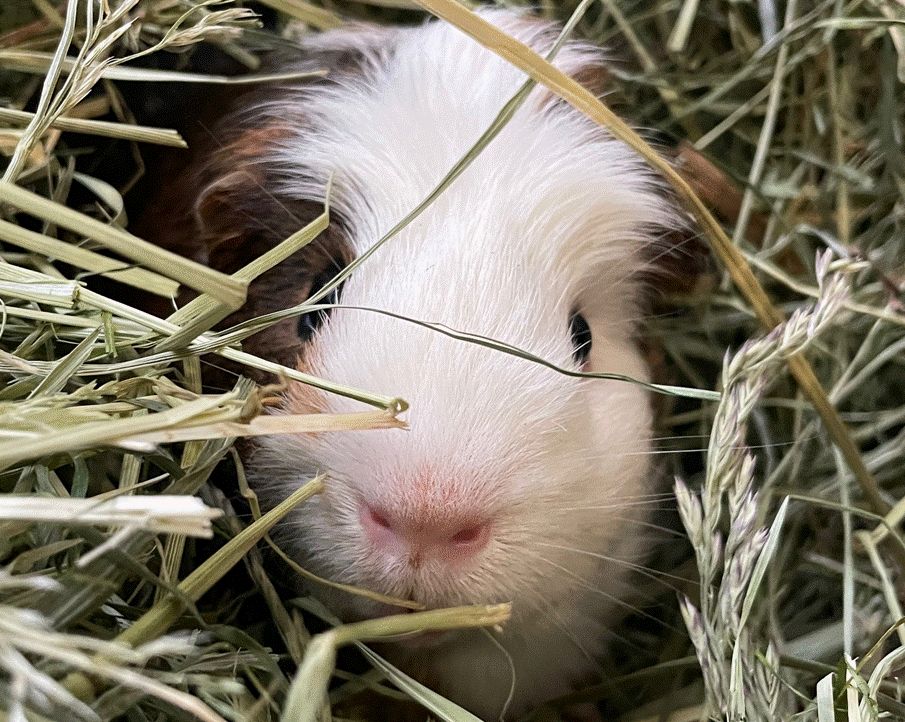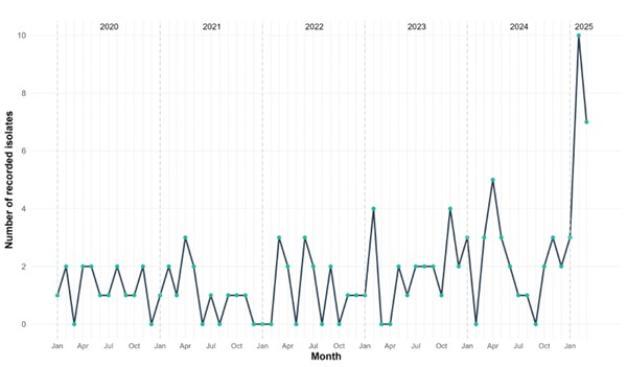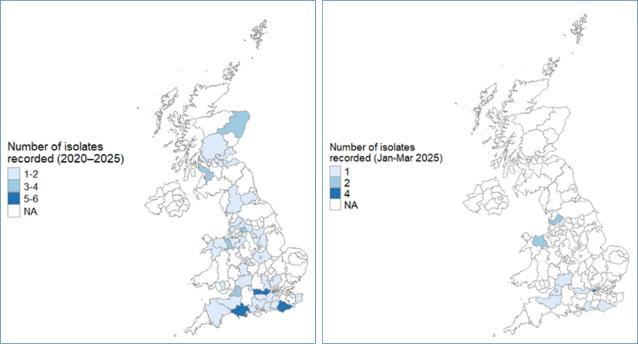RDI: Streptococcus equi subspecies zooepidemicus in guinea pigs

Streptococcus equi subsp. zooepidemicus in guinea pigs
Update 09th April 2025.
This RDI replaces the one published on 18th March 2025.
Summary
Streptococcus equi subsp. zooepidemicus (S. zooepidemicus) is an opportunistic bacterial organism which can be associated with disease in domestic and wild animals. It is also a rare zoonosis 1. In companion animals, it has been associated with outbreaks of haemorrhagic pneumonia in dogs 2 and is recognised as an emerging cause of respiratory disease in cats 3.
In guinea pigs, infection with S. zooepidemicus although seemingly rare, can be severe and often fatal 4, associated with septicaemic infections, particularly abscesses of the cervical lymph nodes (cervical lymphadenitis) and respiratory disease.
What is the reason for the concern?
There have been recent media reports 5 of an outbreak of S. zooepidemicus in a number of guinea pigs in the UK. To date, the authors are unaware of any formal diagnosis, laboratory confirmation, or epidemiological data substantiating these claims. While such reports do not constitute definitive evidence of an outbreak, their appearance underscores the need for enhanced surveillance and targeted diagnostic investigations to assess the potential risk of this infection to both guinea pigs and public health. There is also a gap in our understanding of S. zooepidemicus more generally in UK companion animals.
What data have we used?
SAVSNET collects data in near real-time from a sentinel network of veterinary practices and laboratories across the UK. Here we have searched the vet practice data to identify possible cases of this disease in guinea pigs. In parallel, we also analysed the data from three laboratories to identify the number of reported guinea pig samples tested, including number of isolates of S. zooepidemicus obtained, site of isolates and antimicrobial susceptibility testing (AST) results.
Findings?
In veterinary data, clinical narratives are unstructured, free-text entries that capture clinical information, including observations, diagnoses and treatments. A regular expression (regex) search was conducted on these narratives to identify variations of the term S. zooepidemicus, including common abbreviations, typos, and related terms such as strep equi, s. equi, and zooepidemicus. This search (last carried out on 2nd April 2025) returned 15 guinea pig consultations (2021, n=1; 2022, n=1; 2023; n=1, 2024, n=8; Q1 2025 (n=4), indicating an increase in the documentation of S. zooepidemicus concern over the past two years. This does not definitively confirm the presence of S. zooepidemicus; it only indicates that it has been mentioned in a clinical narrative, likely as part of a differential diagnosis or noted as an owner concern.
In the laboratory data, the number of recorded isolates obtained of S. zooepidemicus and the total number of reported guinea pig samples tested across the past five years are as follows: 15 of 218 (6.9%) in 2020, 13 of 233 (5.6%) in 2021, 14 of 222 (6.3%) in 2022, 21 of 241 (8.7%) in 2023, 25 of 238 (10.5%) in 2024, and 20 of 121 (16.5%) in Q1 2025, with isolations peaking in February of 2025 (n=10) (Fig. 1); similar rises were not evident in dogs, cats or horses. The most common anatomical site of the isolates from guinea pig samples in 2025 were soft tissue abscesses (n=10, 50%) followed by oronasal sites (n=4, 20%).

Figure 1. Total number of recorded isolates of S. zooepidemicus taken from guinea pig samples between January 2020 and Q1 2025 (updated April 7th, 2025)
Isolations of S. zooepidemicus were reported in several geographical regions distributed across England, Scotland and Wales. These locations were based on the postcode of the veterinary practice submitting the original sample. This may suggest multiple separate origins for these cases. However, since the origins of the affected guinea pigs could not be determined, a single point source could not be ruled out.
Of all guinea pig S. zooepidemicus isolates obtained between 2020 and Q1 2025, 88.0% (95/108) had antimicrobial susceptibility testing (AST) results for one or more antimicrobial agents. AST results for S. zooepidemicus isolates obtained during Q1 2025 (20/121) showed, for those with more than 14 tests, full susceptibility (100%) to doxycycline; and low levels of resistance (5%) to enrofloxacin, moxifloxacin and ofloxacin and trimethoprim-sulfamethoxazole. There was also 30% resistance to chlortetracycline and tetracycline. S. zooepidemicus isolates were also fully resistant to azithromycin and clindamycin. Whilst resistance to aminoglycosides is expected as Streptococcus species naturally exhibit low-level intrinsic resistance to these agents 6, total resistance to clindamycin is surprising and warrants further investigation.
PLEASE NOTE that not all antibiotics tested and reported here are approved for use in guinea pigs; further information can be obtained elsewhere, including the BSAVA Small Animal Formulary 7. It is important to note that SAVSNET does not provide prescription advice; treatment decisions should always be made by a qualified veterinary professional based on clinical judgement.

Figure 2. Geographical distribution of S. zooepidemicus isolates taken from guinea pig samples (Updated April 7th, 2025). Left – total number of isolates recorded between January 2020 and March 2025.
Right – total number of isolates recorded between January and March 2025 only.
It is probably too early to tell if this is an outbreak, or just a reflection of increased awareness and sampling. We will continue to monitor these changes in the coming months.
Disclaimer
Vet data: The text mining methods used in this analysis provide a rapid, population-level snapshot of word usage. However, we have not yet undertaken a formal assessment of the context in which these words appear (e.g., whether they indicate disease presence, disease negation, or simply a discussion of concern).
Lab data: It is unlikely that all guinea pigs with S. zooepidemicus‐associated disease will have laboratory sample(s) submitted. Consequently, the lab results presented here are likely an underestimate of the true prevalence.
SAVSNET cannot produce these Rapid Disease Investigations (RDIs) for every possible scenario, and the absence of an RDI does not necessarily mean that there is no issue. The data should not be taken as definitive proof of the presence or absence of events; rather, they are intended to inform discussions about potential changes in disease patterns observed in practice. If you have concerns about your pet’s health, please consult your veterinary surgeon, who is best placed to offer advice.
Advice to owners
If you are at all concerned about the health of your guinea pig, it is important to seek veterinary attention in the first instance and tell them about your concerns regarding this disease. SAVSNET cannot give advice on individual animals. If you already have guinea pigs and are thinking of getting a new one, whether introducing one into an established group or pairing with another, the RSPCA 8 recommend a period of quarantine - this aligns with basic biosecurity9 principles.
Acknowledgements
SAVSNET is incredibly grateful to the vets (both independent and CVS group using Robovet, Teleos and Provet software) and labs (AXIOM, BattLab, Biobest, BioTe, IDEXX, LVS, NWL, UoL and VPG) who submit their data to us, and without whom such RDIs would not be possible. The lab data analysis used in this report is part of the VetClin_AMR project in partnership with the Veterinary Medicines Directorate 10. The lead author was supported by PhD funding provided by Burgess Pet Care.
References
- https://wwwnc.cdc.gov/eid/article/21/1/14-0640_article
- https://www.liverpool.ac.uk/savsnet/focus-on-disease/streptococcus-zoopepidemicus/
- https://pmc.ncbi.nlm.nih.gov/articles/PMC10616676/#:~:text=Abstract,human%20transmission%20of%20Streptococcus%20zooepidemicus.
- https://pmc.ncbi.nlm.nih.gov/articles/PMC10055897/
- https://www.independent.co.uk/news/uk/home-news/pets-at-home-guinea-pigs-strep-outbreak-infection-b2699947.html
- https://pubmed.ncbi.nlm.nih.gov/36164606/
- https://www.bsavalibrary.com/content/formulary/exotic-pets
- https://kb.rspca.org.au/knowledge-base/how-can-i-socialise-my-new-guinea-pig-with-other-guinea-pigs-and-my-family/
- https://pmc.ncbi.nlm.nih.gov/articles/PMC7152020/
- https://www.liverpool.ac.uk/infection-veterinary-and-ecological-sciences/research/vetclin-amr/